Automate Your Way to Success: Mastering Accounting for Short-Term Rentals
Master accounting for short-term rentals with our simplified guide. Explore tips and tricks for managing finances effectively.
May 24, 2024
Michelle

Key Highlights
- Choose the right accounting method for your Short-Term Rental properties
- Use a separate bank account for each property or business entity to track income and expenses
- Categorize your income and expenses to simplify your accounting and tax preparation
- Track your occupancy and revenue to measure performance and profitability
- Automate your accounting processes with online software to save time and reduce errors
- Consider hiring a professional accountant to help you set up your accounting system and navigate tax obligations
Getting Started with the Accounting Workflow
If you own or manage Short-Term Rental properties, such as vacation homes or apartments, you know how important it is to keep track of your income and expenses. Short-Term Rentals have unique accounting challenges, such as variable occupancy rates, seasonal fluctuations, cleaning fees, taxes, and commissions. Proper accounting is crucial for the financial health of your rental business, as it helps you maintain accurate records, optimize cash flow, and comply with tax regulations.
From setting up your accounting system to tracking income and expenses, managing seasonal variabilities, and optimizing tax strategy, we will cover all the essential aspects of Accounting for Short-Term Rentals.
Understanding Accounting for Short-Term Rentals

Accounting for Short-Term Rentals involves keeping track of the income and expenses associated with your rental business. It includes tasks such as recording rental income, tracking expenses, categorizing transactions, and preparing financial reports. A good accounting system for Short-Term Rentals helps you monitor the financial health of your business, make informed decisions, and meet your tax obligations.
The Importance of Proper Accounting in Property Management
Proper accounting is essential for the success of your property management business. It allows you to maintain a clear financial picture, track income and expenses, and make informed decisions about pricing, expenses, and investments. Good accounting practices help you assess the financial health of your rental properties, identify opportunities for growth, and ensure compliance with tax regulations. Proper accounting helps you stay organized and prepared for tax time, making the process smoother and more efficient.
Challenges in Bookkeeping and Taxes
Juggling bookkeeping and taxes for your rental business can pose significant challenges. Managing various financial transactions, distinguishing personal from rental expenses, and calculating tax obligations accurately demand attention to detail. Moreover, staying abreast of evolving tax regulations and maximizing deductions adds complexity to the process. Ensuring meticulous record-keeping for both Short-Term Rental properties and financial statements can be time-consuming. Balancing the intricacies of rental accounting with tax requirements often requires patience and organization. Meeting these challenges head-on is vital to maintaining the financial health of your Short-Term Rental business.
Benefits of Simplified Accounting
By streamlining your financial processes with user-friendly software you can:
- Free up more time to focus on growing your property management endeavors.
- Gain valuable insights into your financial health, enabling you to track income and expenses for better decision-making.
- Ensure compliance with tax laws and provide peace of mind knowing your books are accurate and up-to-date.
Setting Up Your Accounting System
Setting up an effective accounting system is crucial for the success of your Short-Term Rental business. The right accounting system helps you track income and expenses, generate financial reports, and ensure compliance with accounting and tax regulations. Key steps in setting up your accounting system include choosing the right accounting software, creating a chart of accounts, and implementing good accounting practices. By taking the time to set up your accounting system properly, you can streamline your bookkeeping, save time, and gain a clear financial picture of your rental business.
Choosing the Right Accounting Software for Short-Term Rentals
Choosing the right accounting software is essential for managing the financial aspects of your Short-Term Rental properties. There are many options available, so it's important to consider your specific needs and requirements. Look for user-friendly accounting software that offers features tailored to rental businesses, and integrates with other property management software or platforms. Consider the key features you need, such as income and expense tracking, financial reporting, tax preparation, and choose the software that best meets your needs.
Integrating Your Accounting System with Other Rental Platforms

Integrating your accounting system with other tools used in your Short-Term Rental business is a game-changer. Take advantage of the built-in integration options that allow you to automatically sync your income and expenses with your accounting software.
Property Management Software
Integrate property management software with your accounting system to automatically track bookings, expenses, and associated costs.
Listing Platforms
Automatically transfer booking and income data from your Online Travel Agency (OTA) to your accounting software, eliminating manual splitting of payout information.
Upselling Software
Track revenues and additional income generated from guest add-ons like airport transfers or experience packages.
Cleaning & Turnover Software
Automatically track cleaning jobs and maintenance tasks associated with your properties, and ensure the financials are allocated to the correct property for each job.
Payment Processing Platforms
Reconcile payments received through your chosen payment processor in your accounting software, streamlining bookkeeping & record keeping.
Income Tracking and Management

Tracking and managing your rental income is a crucial part of accounting for Short-Term Rentals. It involves recording and categorizing your rental income, tracking occupancy rates, and monitoring cash flow. By effectively managing your rental income, you can ensure a steady cash flow, identify opportunities to increase revenue and make informed decisions about your rental pricing and marketing strategies.
How to Effectively Track Rental Income
To effectively track rental income, it's important to establish a system that allows you to record and categorize your income accurately. Start by setting up a separate bank account for your rental income and expenses to keep your personal and business finances separate. Use accounting software to automate income tracking and expense management. Regularly reconcile your bank statements and review your income reports to ensure accuracy.
Managing Seasonal Variabilities in Income
Managing seasonal variabilities in income is a common challenge for Short-Term Rental properties. It's important to plan and budget accordingly to maintain a healthy cash flow throughout the year. Here are some strategies for managing seasonal variabilities in income:
- Save during peak seasons: During high-demand periods, set aside a portion of your income to cover expenses during slower seasons.
- Adjust pricing: Consider adjusting your rental rates based on seasonal demand to maximize occupancy and revenue.
- Diversify your marketing: Explore different marketing channels and target different types of guests to attract bookings throughout the full year.
- Offer discounts and promotions: During slower seasons, consider offering discounts or special promotions to attract more guests.
- Plan for maintenance and upgrades: Use slower seasons to schedule maintenance and make necessary upgrades to your property.
Expense Management for Short-Term Rentals

Proper expense management is crucial for the financial health of your Short-Term Rental properties. It involves budgeting, tracking, and categorizing your expenses to ensure that you can cover your costs, maintain profitability, and make informed financial decisions.
Categorizing and Tracking Rental Expenses
Categorizing and tracking rental expenses is essential for managing the financial health of your Short-Term Rental properties. It involves keeping detailed records of all your expenses and categorizing them appropriately. Common expense categories for Short-Term Rentals include cleaning fees, maintenance and repairs, utilities, insurance, taxes, and marketing expenses.
Budgeting for Maintenance and Unexpected Costs
Budgeting for maintenance and unexpected costs is crucial for the financial stability of your Short-Term Rental properties. In addition to routine maintenance expenses, it's important to set aside funds for unexpected repairs and replacements. Here are some tips for budgeting maintenance and unexpected costs:
- Conduct regular property inspections to identify potential maintenance issues early.
- Estimate the lifespan of major components and systems in your property and plan for replacements accordingly.
- Set aside a portion of your rental income each month for maintenance and unexpected costs.
- Research and obtain quotes from reliable contractors or service providers to budget for their services.
- Consider purchasing a home warranty or insurance coverage to protect against unexpected costs.
Optimizing Taxes for Short-Term Rentals
Optimizing taxes is an important aspect of accounting for Short-Term Rentals. By understanding the tax obligations and benefits associated with your rental properties, you can minimize your tax liability and maximize your tax benefits. Proper tax planning and compliance can help you save money, improve cash flow, and ensure that you are meeting your legal obligations as a rental property owner.
Understanding Tax Obligations for Short-Term Rentals
Understanding your tax obligations is crucial for managing the financial aspects of your Short-Term Rental properties. Short-Term Rentals may be subject to various taxes, such as income tax, occupancy tax, sales tax, and property tax. It's important to familiarize yourself with the tax regulations and laws in your jurisdiction to ensure compliance.
Deductions and Credits to Maximize Tax Benefits
There are several deductions and credits available to Short-Term Rental property owners that can help maximize tax benefits. Some common deductions include:
- Mortgage interest
- Property taxes
- Insurance premiums
- Cleaning and maintenance expenses
- Property management fees
- Advertising and marketing expenses
- Depreciation of assets
Consult with a real estate CPA or tax professional to ensure that you are taking advantage of all available deductions and credits.
Financial Reporting and Analysis

Financial reporting and analysis are essential for monitoring the performance of your Short-Term Rental properties. This information helps you make informed decisions, identify areas for improvement, and maximize the return on your investment.
Creating Financial Reports for Your Rentals
Creating financial reports for your Short-Term Rental properties is crucial for tracking income and expenses, assessing profitability, and meeting tax obligations. Key financial reports to consider include:
- Balance sheet: Provides a snapshot of your rental property's financial position at a specific point in time, including assets, liabilities, and equity.
- Income statement: Summarizes the revenue, expenses, and profitability of your rental property over a specific period.
- Cash flow statement: Tracks the cash inflows and outflows of your rental property, providing insights into your cash flow and liquidity.
Analyzing Financial Performance and Identifying Opportunities
Analyzing the financial performance of your Short-Term Rental properties is essential for identifying opportunities for growth and maximizing profitability. By analyzing key financial metrics such as occupancy rates, revenue per available room, and return on investment (ROI), you can gain valuable insights into the performance of your rental properties. This information helps you make informed decisions about pricing, marketing strategies, and property improvements.
Best Practices in Short-Term Rental Accounting
Implementing best practices in Short-Term Rental accounting is crucial for maintaining accurate and organized financial records. These practices help you streamline your bookkeeping, optimize your cash flow, and ensure compliance with accounting and tax regulations.
Keeping Accurate and Timely Records
Keeping accurate and timely records is essential for effective Short-Term Rental accounting. It involves documenting all income and expenses, maintaining receipts and invoices, and systematically organizing your financial documents.
Accounting for Short-Term Rentals also involves carefully managing your bank account to track rental income and expenses accurately. Platforms like Vrbo or Airbnb will deposit money into your bank account, which needs to be reconciled within your accounting software. It's essential to account for all gross earnings and expenses related to your rental property, not just the amount that hits your bank account.
Regular Review and Reconciliation Processes
Regularly reviewing and reconciling your financial records involves comparing your recorded transactions with bank statements, credit card statements, and other financial documents to ensure that they align. This process also helps you identify any unauthorized transactions or fraudulent activity, errors, or discrepancies, providing you with peace of mind and financial security.
Time to Leverage Clearing
Accounting for Short-Term Rentals doesn't have to be daunting. By integrating with other platforms (like Clearing) and embracing automation, you can streamline your financial management and leverage deductions for tax benefits. Ensure that you regularly review financial reports to identify opportunities for improvement.
Ready to transform your accounting system? Book a demo today!
Clearing is a Financial Technology Company, not a bank.

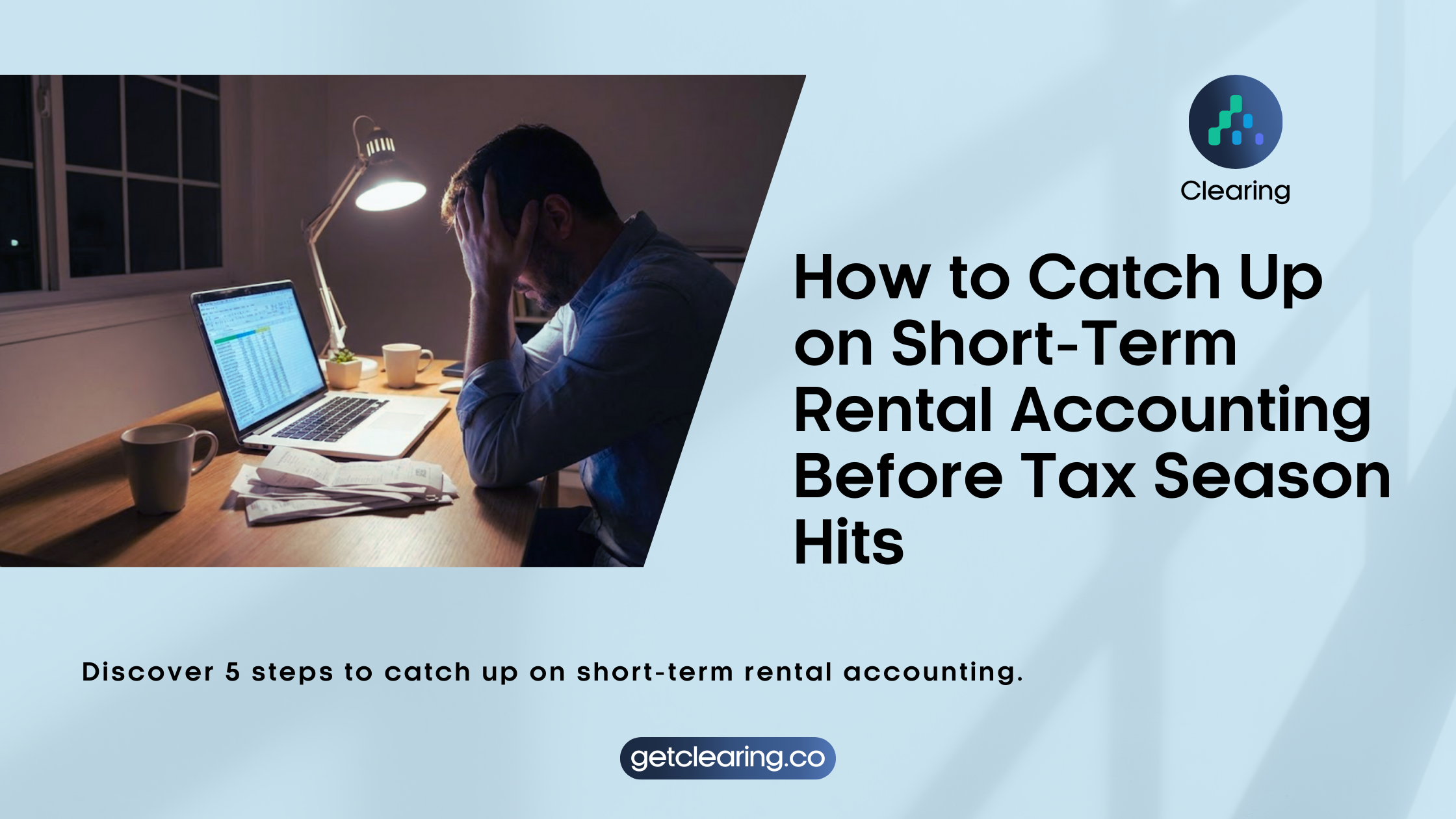
.png)
.png)
.png)
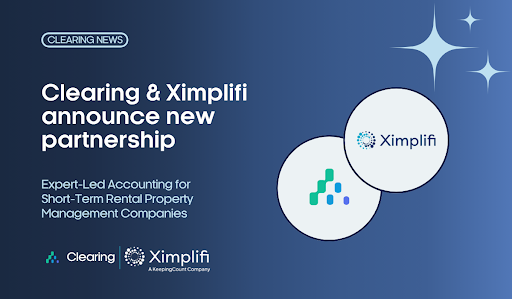
.png)
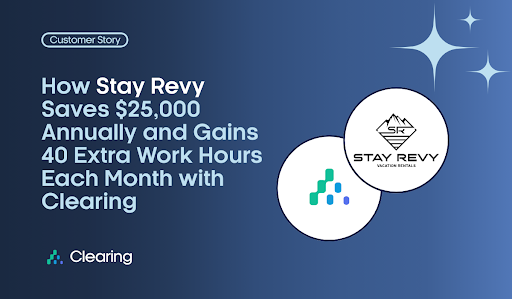
.png)
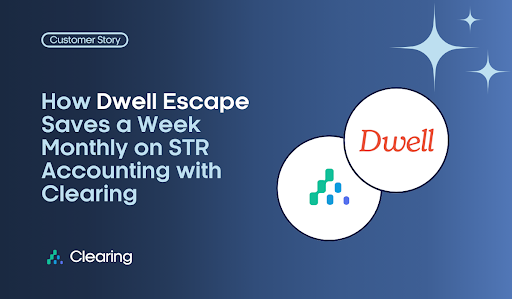
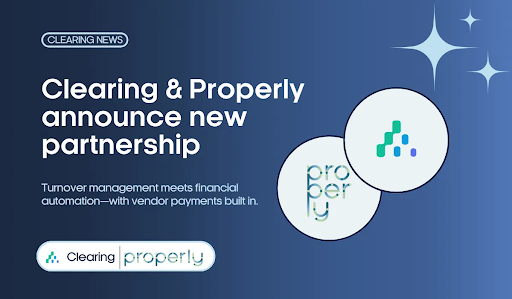
.png)
.png)
.png)
%20(1).png)
%20(1).png)
%20(1).png)
.png)
%20(2).png)
%20(1).png)
%20(1).png)
.png)

.png)
.png)
.png)
%20(1).png)
.png)
.png)
.png)
.png)
.png)
.png)
.png)
%20(1).png)
.png)
.png)
.png)
%20(1).png)
%20(1).png)
%20(1).png)








.jpg)
%20(1).png)
%20(1).png)
%20(2).png)
%20(1).png)

%20(1).png)
%20(1).png)
%20(1).png)


%20(1).png)
%20(1).png)
%20(1).png)
%20(1).png)
%20(1).png)


%20(1).png)
%20(1).png)
%20(1).png)
%20(2).png)
%20(2).png)



%20(2).png)


%20(2).png)
%20(1).png)
.png)


%20(2).png)
%20(2).png)

.jpg)
.png)
.png)
.png)



.png)

.png)
%20(1).png)
.png)

.png)